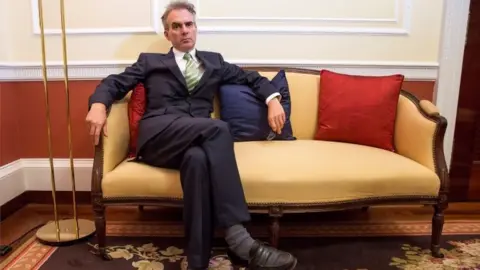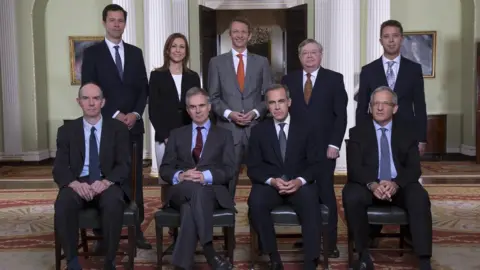Deputy governor sorry for calling economy 'menopausal'
 Reuters
ReutersThe Bank of England's deputy governor has admitted his comments that the UK economy is entering a "menopausal" era "conveyed ageist and sexist overtones".
Ben Broadbent used the phrase in a Daily Telegraph interview about economies that were, he said, "past their peak, and no longer so potent".
But in an internal message seen by the BBC he said he knew some bank staff had been offended and he was "truly sorry".
He told colleagues he should not have used the word.
"I recognise that while these are economic terms that have been used in the past, my use of the word "menopausal" conveyed ageist and sexist overtones and I should not have used it", he wrote on the Bank's internal website.
"I was attempting to explain the meaning of the world "climacteric". As the journalist who was interviewing me has subsequently tweeted, I made it clear in the interview that this is a term which applies to both genders.
He said he wanted to "emphasise how sorry I am for the offence my interview this morning has caused to Bank colleagues".
Earlier he had issued a public apology.
In it he said he was sorry for his "poor choice of language" and the "offence caused".
He said productivity affected "every one of us, of all ages and genders".
But his comments have sparked a backlash.
Sarah Smith, professor of economics at Bristol University, told the BBC they were "not useful".
 Getty Images
Getty Images"It conveys a rather derogatory view of women. I've never thought of the menopause as not productive," she said.
Carolyn Fairbairn, director-general of the CBI, called it a "poor choice of words" that distracted from the real issue at hand.
Jayne-Anne Gadhia, boss of Virgin Money UK, said: "When I read this I thought about my own menopause and was sure he meant that the future is hard work, challenging, renewing, worth fighting for, 100% positive and constantly HOT!"
And TUC general secretary Frances O'Grady said: "There's no need to resort to lazy, sexist comments to describe problems in the economy."
Mr Broadbent sits on the Bank of England's Monetary Policy Committee (MPC), which has been criticised for having only one female member on its nine-strong board.
The economist is also thought to be to among a number of potential successors to the Bank's governor, Mark Carney.
 Getty Images
Getty ImagesArtificial intelligence
In his interview, Mr Broadbent compared a recent slowdown in UK productivity to a similar lull at the end of the 1800s, which has been described as a "climacteric" period.
The term, which is borrowed from biology and is used for both sexes, means "you've passed your productive peak", the deputy governor said.
He suggested that the UK may be seeing a "pause" between two technological leaps forward - akin to one experienced by late-Victorian industrialists from steam to electricity.
However, he said the economy could be awaiting its next big breakthrough, possibly as a result of Artificial Intelligence.
Mr Broadbent later stressed that his use of the word menopausal had only applied to the 19th Century.
The Bank's attitude towards women has been questioned in the past.
In 2013 the Bank announced a plan to phase out £5 notes featuring social reformer Elizabeth Fry, without plans to put a woman on any other bank notes.
After pressure from campaigners the Bank announced it would make Jane Austen the face of the new £10 note.
